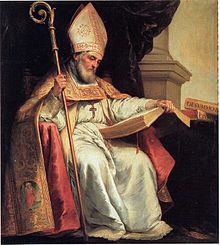Isidorus Hispalensis
| Saint Isidore of Seville | |
|---|---|

St. Isidore, depicted by Murillo
|
|
| Bishop, Confessor, and Doctor of the Church | |
| Born | c. 560 Cartagena, Spain |
| Died | 4 April 636 Seville, Spain |
| Venerated in |
Roman Catholic Church Eastern Orthodox Church |
| Canonized | 1598, Rome by Pope Clement VIII |
| Feast | 4 April |
| Attributes | bees; Bishop holding a pen while surrounded by a swarm of bees; bishop standing near a beehive; old bishop with a prince at his feet; pen; priest or bishop with pen and book; with Saint Leander, Saint Fulgentius, and Saint Florentina; with his Etymologiae |
| Patronage | the Internet, computer users, computer technicians, programmers, students |
Saint Isidore of Seville (Latin: Isidorus Hispalensis; c. 560 – 4 April 636), a scholar and, for over three decades, Archbishop of Seville, is widely regarded as the last of the Fathers of the Church, as the 19th-century historian Montalembert put it in an oft-quoted phrase, "The last scholar of the ancient world."
At a time of disintegration of classical culture, and aristocratic violence and illiteracy, he was involved in the conversion of the royal Visigothic Arians to Catholicism, both assisting his brother Leander of Seville, and continuing after his brother's death. He was influential in the inner circle of Sisebut, Visigothic king of Hispania. Like Leander, he played a prominent role in the Councils of Toledo and Seville. The Visigothic legislation that resulted from these councils influenced the beginnings of representative government.
His fame after his death was based on his Etymologiae, an etymological encyclopedia which assembled extracts of many books from classical antiquity that would have otherwise been lost.
Isidore was probably born in Cartagena, Spain, a former Carthaginian colony, to Severianus and Theodora. Both Severianus and Theodora belonged to notable Hispano-Roman families of high social rank. His parents were members of an influential family who were instrumental in the political-religious manoeuvring that converted the Visigothic kings from Arianism to Catholicism. The Catholic Church celebrates him and all his siblings as known saints:
...
Wikipedia
